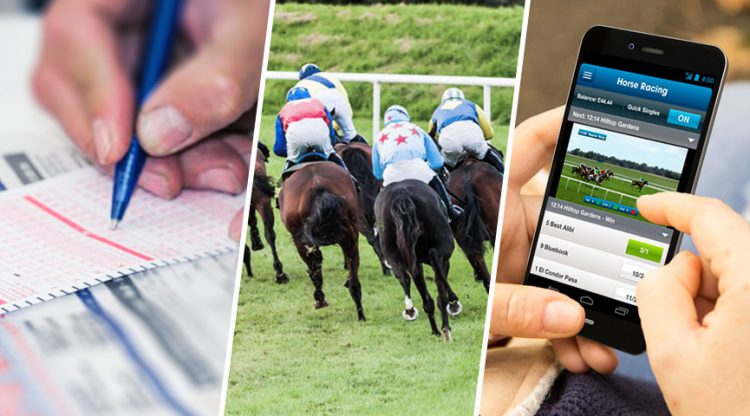Horse Racing FAQ – Betting on Horses Q&A
The 2019 Breeders’ Cup is being held on Friday, November 1st and Saturday, November 2nd. It is said to be “the best event for wagering on horses in the world” due to the fact that no other event has as many races, top-class horses, and as large of wagering pools as the Breeders’ Cup. Some call it the Super Bowl of horse racing! This represents an excellent opportunity to get started betting on horse races.
Recently, I have written two guides on this topic: A Complete Guide to Betting on Horse Racing and Best Horse Racing Betting Sites. But horse racing is a complex topic, and if you are new to wagering on it, without doubt, you have many questions.
In this article I will answer some common newbie questions.
Placing Bets
Q: Why bet on horse racing

This question may answer itself if you have spontaneously developed an interest in horse racing. If not, though, you may be wondering why horse racing is fun to follow and bet on.
In fact, some people resist getting into horse racing for several reasons. First of all, there are those who believe (incorrectly) that horse racing is not a “true” sport, arguing that it does not require athletic ability. That is simply untrue. Jockeys actually have to work hard to stay in shape. Plus, an astonishing amount of hard work, training, and strategy goes into successful horse racing, which is an ongoing effort of teamwork between the horse, the jockey, and the trainer.
If you ever have a chance to watch a horse race in person, you are in for an adrenaline rush, even sitting in the enclosures. Even from the other side of a computer screen or television, you can pick up on some of that rush.
In short, horse racing is a sport which combines power, speed, smarts,
and communication, and there is a lot of money to be won both by the jockeys and by the punters.
Q: Isn’t horse racing just for rich people?
It is true that you will pay quite a bit to attend many prominent horse racing events. But you actually might be surprised at how affordable tickets to many horse races are. Plus, think about what you would pay to attend the Super Bowl. Most people cannot afford to pay thousands of dollars to attend the Super Bowl, but that does not stop them from betting on NFL football.
By contrast, tickets for Royal Ascot (one of the biggest international horse racing events) this year are on sale starting at £37. That is nothing compared to the cost of a Super Bowl ticket!
Plus, you can wager online on horse racing without attending the races in person at all—and that is very affordable. So no, horse racing definitely is not just for rich people; that is just a misperception!
Q: How do you bet on a horse at the track?
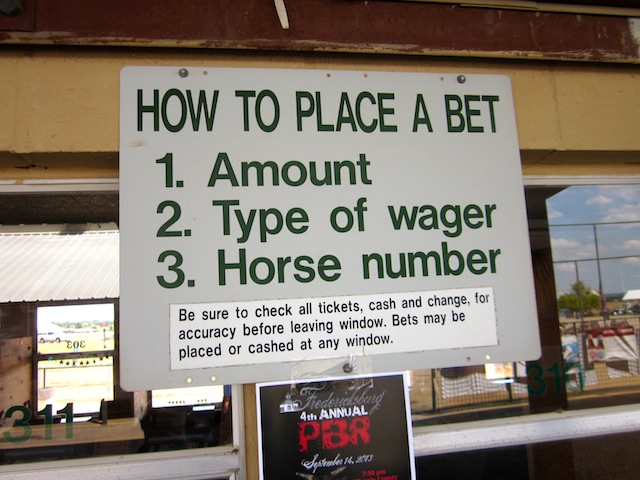
Wondering how you would bet on a race if you did attend in person?
Well, you can usually use your mobile device to bet online. Unfortunately, you cannot if you are actually at the race track. Many racecourses have a ban on mobile use for betting.
That means you need to place your bet by waiting in line at the teller window.
When you get to the window, there are four items of information you need to give the teller:
- The track you are betting on.
- The amount that you are wagering.
- The type of bet you are placing.
- The number(s) of the horse on which you are wagering.
With a complex bet, you probably should write all that down before you get to the window, especially as a beginner. That way you do not screw up your bet.
Q: How do you bet on horses online?
Wagering on horse racing online is much easier and more convenient than betting at the racecourse.
There are no crowds to wade through, no lines to wait in, and no tellers to deal with. You do not need to worry about verbally placing your bet and getting something wrong.
Instead, you just log into your online betting platform. You will have to choose one first. We have a list of recommendations for sportsbooks for horse racing here.
You then select the race you are interested in and fill out your online betting slip. Be sure to double check it before you submit it to make sure that everything is correct. Then you will submit the slip and wait for the action to unfold, as simple as that. If you win, the payout will be credited directly to your account.
Q: What are the different types of horse racing bets?
There are numerous different types of horse racing wagers you can make. These include straight bets for horses to win, show, or place as well as exotic bets like exacta, trifectas, superfectas, daily doubles, head-to-head bets, and so on.
You can read about these types of bets in-depth in this guide.
Q: What types of bets are best for beginners?

As a beginner, if you want to maximize your chances of winning, you should focus on straight bets. The easiest to win is a “show” bet, followed by a “place” bet. With a show bet, you need to correctly guess that a horse will finish in the first three, but you do not need to know which position it will come in. To win a place bet, your horse needs to finish either first or second, but again you do not need to guess which.
If you bet on a horse to win, it needs to come in first, so there is less room for error. That makes a “win” bet harder to win than “show” or “place,” but still an appropriate wager for a beginner.
Another type of bet you might consider is head-to-head, where you are simply wagering that one horse will finish in front of another. Neither of the horses needs to win, show, or place. In fact, they could both finish last and you still would win money so long as the horse you picked finishes before the other.
Head-to-head bets are great because you do not need to be an expert on the entire field of horses competing in the race, just an expert on two of them.
The bets which you are unlikely to win as a beginner (or even an intermediate or advanced punter in many cases) are the exotic ones. Winning an exacta is tough, and it is even harder to win a trifecta. Winning a superfecta is very challenging. It is quite hard to win a daily double or a pick 3 or a pick 4 as well.
Q: Where can I watch horse races?
That depends on your region as well as the region where the horse race in question is taking place. For example, if you are in the UK and you want to watch UK horse races, they are currently on ITV (they used to be on Channel 4).
If the race you want to watch is not on a television channel you have access to, do not despair. If you join a sportsbook like Coral which streams races live, you will be able to watch them on your desktop, laptop, or mobile device.
You do need to be placing a bet to watch a specific race on a sportsbook’s live streaming service, but that bet is almost always going to be minimal, often as little as $1 or £1.
Terminology
Q: Will I ever learn the terminology?
Exacta? Quinella? What is an oaks race? How about a distaff race? What about a claiming race? If you are just getting into betting on horse races, all the terminology can make your head spin.
Does it take a while to get used to all these terms? Sure, but it is not as complicated as you think. And the good news is that if you develop a passion for something, it becomes easier to absorb the information. So if you are becoming interested in horse racing, dive in and explore that. You may very well soak up all those terms faster than you expect.
Read through our horse racing guide here to start familiarizing yourself with terms for horses, track conditions, and different types of races.
Q: What are blinkers?
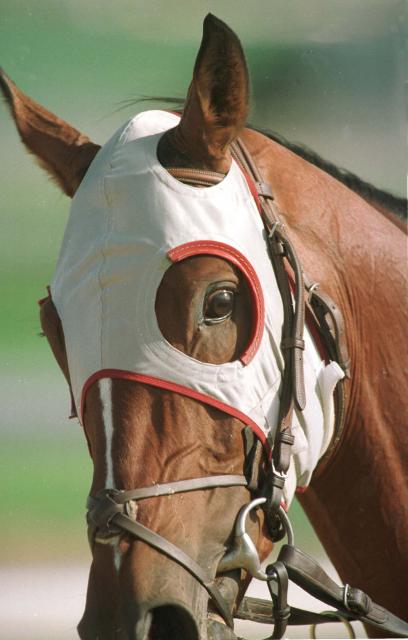
These are the cups you see covering one or both of a horse’s eyes in a race. Coverage of an eye may be complete or partial.
There are a number of different types of blinkers, and you may be wondering what they are worn for. They actually have a variety of functions, everything from preventing drifting to reducing distractions. They may also protect a horse’s eyes from dirt.
If you are trying to figure out what effect blinkers will have on a race, you need to research to learn more about the horse and why it may be wearing blinkers in this particular race.
In some cases, the effect of blinkers can be quite significant. A horse which has never worn blinkers before for example will often run nearer the lead.
Q: What is the tote board?
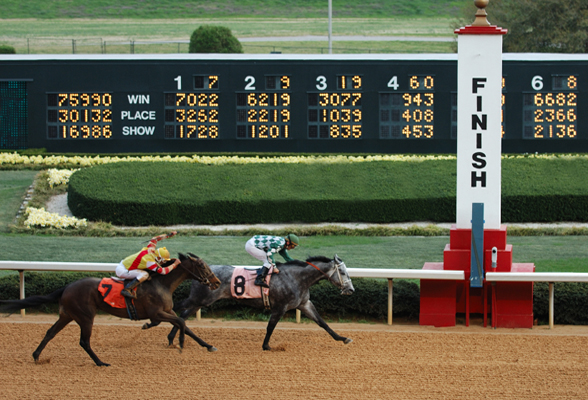
If you are attending a horse race, the tote board is the large infield board with the flashing lights to attract your attention. “Tote board” is actually short for “Totalisator.”
On this board, you can see the current odds for each of the horses racing as well as the total bets on each.
Q: What is “dead heat?”
This term simply refers to a tie. It does not need to be a tie for first place; it can, in fact, refer to any placement.
Q: What is a length, and what is a hand?
The height of a horse is measured in “hands.” Each “hand” is equal to four inches. The measurement starts at the ground and spans as high as the shoulder, but no higher.
And the length. This is a general unit of measure, equal to approximately 8 feet. It is not specific to one horse or another; it is simply used to describe the length between horses. So if one horse is running half a length in front of another, that means that there is a gap between them equal to about 4 feet.
Q: What are some terms which describe where a horse is running in relation to the rest?

Here are a couple which are useful to know:
Pacesetter: The horse which is in the lead during a race is “setting the pace” for the others, and is thus known as the “pacesetter.”
Stalker: There is often a group of horses in the lead. If there is a horse which is trailing just behind that group, it is referred to as a “stalker.”
I will get into this in more depth shortly.
Betting Strategically
Q: What are the different types of track conditions?
The conditions of a track are measured with reference to the relative moisture of that track. Here are the different conditions you will encounter:
- Fast: This is a dry track which is even on top and ideal for racing.
- Wet Fast: If a fast track gets damp on the surface (as from a rain shower), but is still hard, smooth, and dry underneath, it is called “wet fast.”
- Good: This is a track which is wet, but not muddy.
- Muddy: If a track is soaked through and both the surface and the base have become spongy, it is classified as muddy.
- Sloppy: This is a track which is so wet that there are pools of standing water on the surface.
- Slow: A track which is completely and thoroughly drenched is referred to as “slow.”
- Off track: This is a broad category encompassing all of the above conditions except for fast.
Because horse races are held all around the world, often in rainy climates (like the UK), you can expect to be watching and wagering on races with all of these track conditions at some point.
Researching different horses, you will find that they each have their track preferences. One horse for example may only do well on fast tracks, while another may actually do pretty well with a good or wet fast track. Learning this information may shed some light on which horse is likely to have an edge over the rest.
Q: What is “form?”
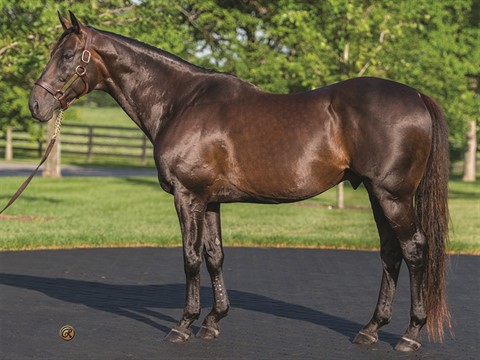
“Form” is a word in horse racing which might refer to a couple of different things.
First of all, a horse’s “form” may be a record of information about that horse. This could include breeding information as well as performance history. You’ll find older data on the left, and newer date on the right. This is a useful summary to review while you are handicapping horses.
The other meaning refers to the condition of the horse. A horse which is “in form” is one which is fit and healthy and ready to run. A horse which is “off form” is one which is not in a good condition to run. Horses which are off form do sometimes race, but they usually do not do well.
If you look at the recent races on the horse’s form (the other kind of form—the record of previous events), you can usually get a pretty good idea for whether a horse is in good shape or not. Also check out morning exercises if you can on the day of a race.
Horses come into form and go off of form on a regular basis. No horse is going to be in prime condition all the time. So keep a close watch on what is going on. Even a horse that usually is amazing on the track can have a bad day.
Q: What is “pace?”
This refers to the overall speed of a race. It does not refer to the speed of each individual horse. But as you might guess, certain paces favor certain horses and not others.
Pace can be broken into three periods:
- Early
- Middle
- Late
For each period, pace may be classified as slow, normal or fast.
Q: What is “running style?”

In the terminology section of this FAQ, I briefly discussed a couple of positions in which horses may run.
A horse’s “running style” refers to the position which that horse favors.
So for example, a horse which tends to run near the lead at the start of a race is called a “frontrunner.” That is that horse’s running style.
Horses which hang back behind the group of frontrunners are called “stalkers.” They may also be known as “pace pressers” as they are pushing the horses in front of them to go faster to maintain their lead.
“Closers” on the other hand run in the back for much of a race, but may put on a burst of speed at the end.
Different types of races, track conditions, and other factors all play into whether a horse with a particular running style will be at an advantage or disadvantage in a race.
Furthermore, it is important to know the running style of each horse so that you can make sense of what you are seeing. The horse in front is not always going to win a race. Sometimes a skilled closer may actually overtake them all.
Q: What is “speed?”
You would think that the “speed” of a horse is obvious. It refers to the horse which can run the fastest, right? But how do you actually figure out which horse that is? A horse which can run fastest on a fast track may not be the fastest horse on a muddy track. The fastest horse in a sprint may not be the fastest horse in a route, and so on.
In order to help punters to evaluate the speed of different horses with complex factors such as these taken into account, “speed figures” have been developed. The most popular and widely used are probably the following three:
- Equibase Speed Figures
- BRIS Speed Figures
- Beyer Speed Figures
Beyer Speed Figures are manually calculated, while the other two are generated through computer algorithms.
The numbers assigned to different horses allow you to make swift and easy comparisons.
Just remember that evaluating horses is a complicated process, and you need more than just a horse’s speed figure to gauge its likelihood of winning a race.
Q: What is class?

Class is a measure of how competitive a particular horse is as well as how challenging a particular race is.
Let me break this concept down.
A given horse is assigned a particular class. This refers to the level at which the horse is considered a contender to win. As a horse becomes more competitive, it may be assigned a higher class. If it drops in its abilities, it may also drop in class.
Races are assigned classes with various factors taken into account. The distance, type of race, track conditions, and claiming price all can impact the class of the race.
Races are broken down into non-claiming and claiming races, as are horses
Claiming horses are up available for sale, and may run in claiming races. Non-claiming horses are not for sale and may only participate in non-claiming races.
With claiming horses, you can check their prices to see how they are valued, which is an easy way to determine their class.
There are several types of non-claiming races for horses which are not on sale. From low to high in terms of class, they are:
- Maiden special weight
- Allowance
- Stakes
There are further class breakdowns for the races within each of those categories.
So if you are watching a maiden claiming race, you are looking at horses which have never won a race and which are for sale. This is a low-class race for low-class horses.
If you are watching a Grade 1 Stakes race, you are at the opposite end you are watching a competition for the highest class of horses in the sport.
Because horses are only supposed to compete among others of their own class, most horses in any given race should be considered competitive with the rest. Obviously a maiden horse is never going to compete in a Stakes race or vice versa.
But because horses can move up and down in class, there are sometimes inequities. A horse which just barely inched into a higher class may be scarcely competitive with the other horses in the race or not competitive with them at all. The reverse is possible as well. A horse may move down in class, but still be significantly better than the other horses in that class and event.
Pay close attention to rises and falls in class—especially if they are counter intuitive. If a horse wins big and suddenly drops in class, it may indicate health problems.
Conclusion: You Will Not Pick Up Horse Racing Overnight, But Taking the Time to Learn Can Pay Off Big
Horse racing has a lot of terminology and complexity associated with it, so much that a lot of bettors are too intimidated to explore it. But if you wade in and start learning, you will quickly discover that this is a thrilling, fascinating sport to watch and bet on. At that point, diving in deep is easy. You won’t pick up everything you need to know immediately, but if you continue to study horses, jockeys, trainers, tracks, and races, you can develop winning strategies. Check out our recommended sportsbooks for betting on horse racing online!
Ready to start betting on horses? Claim your $250 deposit bonus from Bovada Racebook now!
More Great Articles:

